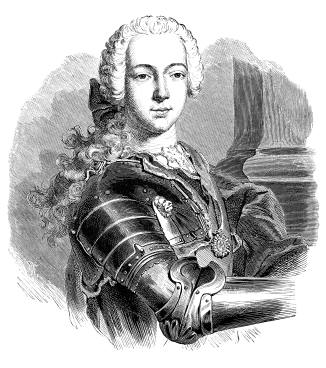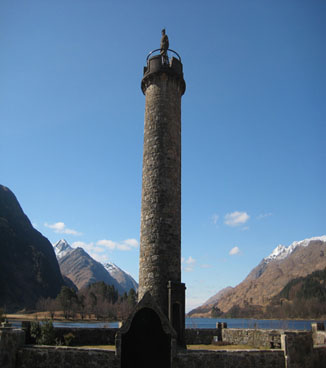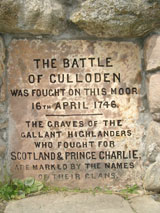Bonnie Prince Charlie is revered in Scotland as the romantic, tragic hero of “the ’45”, the failed Jacobite Uprising of 1745. Grandson of the exiled Scottish Catholic King James II, Prince Charles Edward Stuart (to give him his proper title) was born in December 1720 in Rome. In 1745, at the age of 24, he set sail for Scotland hoping to raise enough support to restore his father, Prince James, to the throne.

Charlie raised his father’s standard at Glenfinnan at the head of Loch Shiel in the north west Highlands, and raised a volunteer army made up of local clansmen. The army gathered strength and they marched on Edinburgh, then defeated the only government army in Scotland at the Battle of Prestonpans. They continued south, winning several more battles and finally reaching Derby in England by November 1745.
Despite the Prince’s objections, the nobles advising him got cold feet at this point. The Jacobite Army were exhausted after their march south, there were rumours of a large English army being amassed, and they were not confident that they could take the City of London without additional support from the French, which was not guaranteed. The Jacobites decided to retreat to Scotland and re-group. They were pursued north by government forces led by the Duke of Cumberland, King George II’s son, and he eventually caught up with them at Culloden Moor near Inverness on 16 April 1746.
Bonnie Prince Charlie made several tactical errors at Culloden, not least in forcing his men to fight on the flat, open, marshy ground. The Jacobite swords and daggers were no match for the government musket and cannon, and the battle was soon over, with huge losses on the Jacobite side. It is believed somewhere in the region of 1500 – 2000 Jacobite soldiers were killed, compared to only around 50 deaths on the government side. The savagery of the defeat earned the Duke the nickname “Butcher Cumberland”. Contemporary accounts relate that for two days after the battle, the moor was searched and all those wounded were put to death.

After the battle the Prince abandoned the Jacobite cause and fled west, with government troops in hot pursuit. Despite a £30,000 bounty on his head, he was helped by many Highlanders, none of whom betrayed him. He made it to the Isle of Skye, where a local woman, Flora Macdonald, helped him escape by taking him out on a small boat disguised as “Betty Burke”, her Irish maid. He successfully evaded capture and left Scotland in September 1746 aboard a French frigate, never to return to his native land. He lived in exile in France and later Italy, and died in Rome in 1788. Culloden was to be the last battle fought on British soil.

Bonnie Prince Charlie’s flight from Skye is immortalised in the folk song, The Skye Boat Song, which you can hear here.
Visitors to Scotland today can visit many places associated with Bonnie Prince Charlie, including the Culloden Battlefield site, the Glenfinnan Monument at Loch Shiel, and Flora Macdonald’s grave on the Isle of Skye.
Related posts
Whoops! No connected account found. Try connecting an account first.

